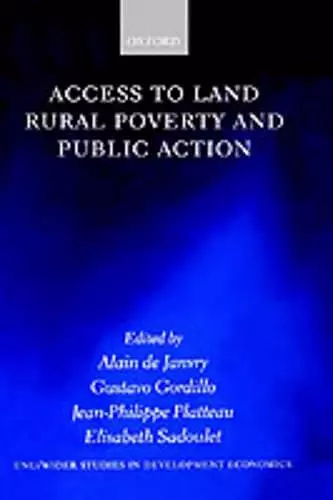Access to Land, Rural Poverty, and Public Action
Jean-Philippe Platteau editor Alain de Janvry editor Elisabeth Sadoulet editor Gustavo Gordillo editor
Format:Hardback
Publisher:Oxford University Press
Published:29th Mar '01
Currently unavailable, and unfortunately no date known when it will be back

Land is a fundamental productive asset in agrarian economies. The rules that codify access to land and the way jurisdiction over land is distributed among members of a community have a powerful influence over how efficiently land is used, the incidence of poverty, and the level of inequality in the community. Yet we observe that much of the land in less developed countries is underutilized and/or misused from a sustainability standpoint, that lack of access to land or unfavorable terms of access remain a fundamental cause of poverty, and that unmet demands for land can be a source of political destabilization. At the same time, there presently exist unusual opportunities to reopen the issue of access to land. They include an increasing concern with the efficiency costs of inequality in land distribution, devolution of common property resource management to users, large scale redefinitions of property rights in the context of transition economies in Eastern and central Europe and the end of white rule in South Africa, liberalization of land markets, mounting pressure to deal with environmental issues, the proliferation of civil society organizations voicing the demands of the rural poor, and more democratic and decentralized forms of governance. There are many channels of access to land and each of these affects how land is used. While much attention has traditionally been given to state-led redistributive land reforms, this is only one among a variety of options, and currently not the easiest to manage politically. Other channels include inheritance and inter-vivos transfers, intra-household and intra-community land allocations, community titling of open access resources, the distribution of common property resources and the individualization of rights, decollectivization, land markets and land market-assisted land reforms, and land rental contracts. This book analyzes each of these channels of access to land, and recommends ways of making them more effective for poverty reduction.
Thorough and closely argued essays ... one suspects that this work will form a key text in advancing the 'post-Washington consensus' in this area. * Development Policy Review *
Clearly and persuasively brings land issues back into the policy agenda ... rich in evidence and analysis ... refreshingly innovative in terms of methodology ... This book will be of relevance to readers interested in land issues in developing countries and, more broadly, to all those interested in poverty reduction, for which better access to land is an indispensable condition. * Raul Hopkins, International Fund for Agricultural Development *
For academics and policymakers interested in rural development, this book should be required reading ... Unlike most edited books this one hangs together exceptionally well; thanks in large part to the introductory chapter by the editors, which provides a road map and an analytical umbrella within which the chapters fit ... an extremely helpful resource for anyone serious about land relations and development. * Journal of Development Economics *
ISBN: 9780199242177
Dimensions: 242mm x 162mm x 29mm
Weight: 808g
666 pages